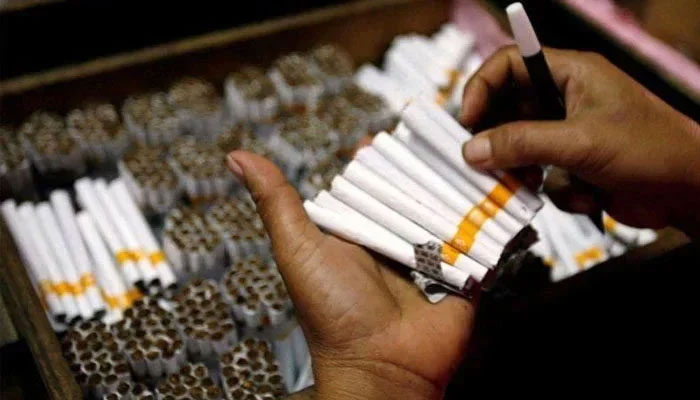Tobacco industry pushes for tax cuts, new tier despite manipulative practices: SPDC
KARACHI: The tobacco industry has placed two major demands before the government ahead of the upcoming budget: the introduction of a third tax tier with a reduced rate of Rs2,525 per 1,000 cigarette sticks, and a cut in the current federal excise duty (FED) from Rs5,050 to Rs3,800 per 1,000 sticks, learned from multiple sources.
These demands come at a time when the industry faces increasing scrutiny for alleged manipulation of production data and tax evasion.Speaking at a roundtable organised by the Sustainable Development Policy Institute (SDPI) on the tobacco industry’s tax tactics in Karachi, Muhammad Asif Iqbal from the Social Policy and Development Centre (SPDC) accused major players of distorting declared production figures to influence fiscal policies.
He revealed that although tobacco production increased by 19.2 per cent in the July-December period of the current fiscal year, compared to the same period in the previous fiscal year, the government’s revenue from FED declined by 2.4 per cent, and GST collection dropped significantly by 26.1 per cent.
According to Iqbal, illicit (non-tax-paid) trade is primarily driven by locally manufactured cigarettes, which account for 21.3 per cent of the market. Additionally, smuggled cigarettes contribute to 11.9 per cent of total cigarette consumption. These figures indicate that while illicit trade is a concern, it is significantly lower than the exaggerated claims made by the tobacco industry.
The SPDC’s findings challenge the narrative often used by tobacco companies that higher taxes drive consumers toward smuggled or counterfeit products. Instead, the data suggests the industry's own practices contribute significantly to revenue losses and illicit trade.
As the budget season nears, public health advocates and fiscal experts warn that yielding to the tobacco industry’s demands could undermine both health policy goals and tax integrity. There are growing indications that the IMF may be inclined to accept the government’s proposals, a development that raises concerns about the Fund appearing to side with the tobacco industry. If any flexibility is granted, the tobacco sector could potentially gain an additional Rs10-20 billion annually, at the cost of a significantly higher health burden for the country, potentially ten times greater than the revenue benefit.
-
 Pamela Anderson, David Hasselhoff's Return To Reimagined Version Of 'Baywatch' Confirmed By Star
Pamela Anderson, David Hasselhoff's Return To Reimagined Version Of 'Baywatch' Confirmed By Star -
 Willie Colón, Salsa Legend, Dies At 75
Willie Colón, Salsa Legend, Dies At 75 -
 Prince Edward Praised After Andrew's Arrest: 'Scandal-free Brother'
Prince Edward Praised After Andrew's Arrest: 'Scandal-free Brother' -
 Shawn Levy Recalls Learning Key Comedy Tactic In 'The Pink Panther'
Shawn Levy Recalls Learning Key Comedy Tactic In 'The Pink Panther' -
 King Charles Fears More Trouble As Monarchy Faces Growing Pressure
King Charles Fears More Trouble As Monarchy Faces Growing Pressure -
 Inside Channing Tatum's Red Carpet Return After Shoulder Surgery
Inside Channing Tatum's Red Carpet Return After Shoulder Surgery -
 Ryan Coogler Brands 'When Harry Met Sally' His Most Favourite Rom Com While Discussing Love For Verstality
Ryan Coogler Brands 'When Harry Met Sally' His Most Favourite Rom Com While Discussing Love For Verstality -
 Sarah Pidgeon Explains Key To Portraying Carolyn Bessette Kennedy
Sarah Pidgeon Explains Key To Portraying Carolyn Bessette Kennedy -
 Justin Bieber Rocked The World With Bold Move 15 Years Ago
Justin Bieber Rocked The World With Bold Move 15 Years Ago -
 Sam Levinson Wins Hearts With Huge Donation To Eric Dane GoFundMe
Sam Levinson Wins Hearts With Huge Donation To Eric Dane GoFundMe -
 Kate Middleton Steps Out First Time Since Andrew Mountbatten-Windsor's Arrest
Kate Middleton Steps Out First Time Since Andrew Mountbatten-Windsor's Arrest -
 Inside Nicole 'Snooki' Polizzi's 'private' Marriage With Husband Jionni LaValle Amid Health Scare
Inside Nicole 'Snooki' Polizzi's 'private' Marriage With Husband Jionni LaValle Amid Health Scare -
 Germany’s Ruling Coalition Backs Social Media Ban For Children Under 14
Germany’s Ruling Coalition Backs Social Media Ban For Children Under 14 -
 Meghan Markle Shuts Down Harry’s Hopes Of Reconnecting With ‘disgraced’ Uncle
Meghan Markle Shuts Down Harry’s Hopes Of Reconnecting With ‘disgraced’ Uncle -
 Liza Minnelli Alleges She Was Ordered To Use Wheelchair At 2022 Academy Awards
Liza Minnelli Alleges She Was Ordered To Use Wheelchair At 2022 Academy Awards -
 Quinton Aaron Reveals Why He Does Not Want To Speak To Wife Margarita Ever Again
Quinton Aaron Reveals Why He Does Not Want To Speak To Wife Margarita Ever Again




